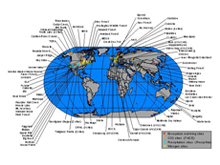The INTERFACE research coordination network brings together three groups within the global change research community:
- Researchers conducting field experiments
- Researchers who use ecosystem-scale models
- Researchers working on land-atmosphere interactions in Earth system models (ESMs).
INTERFACE activities bring together these three groups to advance global environmental change research by
- Incorporating realistic biological responses into ESMs, and
- Facilitating the design of field experiments and computer simulations that are best suited to improving the performance of ESMs.
INTERFACE will hold a series of workshops, working group meetings, and international meetings, starting in early 2011. Watch this page for details. INTERFACE seeks to involve students and postdoctoral researchers in all activities, and will sponsor cross-disciplinary research experiences for students.
Upcoming Activities
|
See Activities page for a full list of upcoming and past activities related to INTERFACE |
04/12/2016
After the extreme: Measuring and modeling impacts on terrestrial ecosystems when thresholds are exceededPlace: Accademia dei Georgofili, Florence, ItalyDate: April 12-15, 2016We invite applications from US-based graduate students and postdoctoral researchers to attend the workshop “After the extreme: Measuring and modeling impacts on terrestrial ecosystems when thresholds are exceeded” to be held in Florence, Italy 12-15th April 2016. The workshop is organized by the two international research networks, INTERFACE and CLIMMANI. Selected applicants will have their travel and lodging expenses reimbursed by INTERFACE. Meeting details are below. Please forward this message to potentially interested candidates.
|
05/22/2016
Phosphorus Cycling in Terrestrial Ecosystems: Taking a new approach to advancing our fundamental understanding through a model-data connectionPlace: Townsend, Tennessee, USADate: May 22-25, 2016
We invite applications from US-based graduate students and postdoctoral researchers to attend the workshop “Phosphorus Cycling in Terrestrial Ecosystems: Taking a new approach to advancing our fundamental understanding through a model-data connection” to be held in Townsend, Tennessee, from May 22-25, 2016. The workshop is sponsored by the US Department of Energy, the National Science Foundation, and the NSF-funded INTERFACE Research Coordination Network. Selected applicants will have their travel and lodging expenses reimbursed by INTERFACE. Meeting details are below. Why hold a workshop on this topic? Phosphorus (P) has been shown to limit a number of fundamental processes in a wide range of ecosystems; however, despite its importance, most earth system models do not currently include any manner of the P cycle. This hinders the utility of these models for generating and testing hypotheses and for forecasting the effects of global change. Importantly, a critical challenge for P modeling efforts is also a critical challenge for the scientific community as a whole; namely, determining a way forward for improving our understanding of the key drivers, processes, and global change responses of the P cycle. Bringing together P experts would allow for the addressing of this need through: (1) a more synthetic understanding and conceptualization of P cycle dynamics, (2) the merging of varied P and associated data, (3) improved process-based modeling of the P cycle, and (4) P data-model integration. Another potential success stems from the power of explicit collaborations between empiricists who study P cycling and modelers considering the inclusion of P into models. Participants will represent diverse theoretical, empirical, and numerical modeling perspectives that are critical for improving our understanding of the terrestrial P cycle in the context of global change. The meeting will include experts that span a variety of research perspectives and methods and is expected to have five outcomes: 1) an improved understanding of terrestrial P cycling from varied assessments; 2) synthesized datasets that will be publicly available for analysis and modeling; 3) a meeting report that will be submitted for publication in a peer-reviewed journal and a complementary set of data-based papers; 4) a set of plans for collaborative research project(s)/grant(s) to identify approaches likely to gain the knowledge necessary for improved understanding in critical areas; and 5) a network of individuals dedicated to fostering cross-disciplinary approaches to P research. The organizing committee consists of Xiaojuan Yang (ORNL, USA), Rich Norby (ORNL, USA), Sasha Reed (USGS, USA), Jeff Dukes (Purdue University, USA), and Peter Thornton (ORNL, USA). |
| 10/28/2015
Student Collaborative Exchange Program To further facilitate collaboration in the research community, INTERFACE plans to sponsor a limited number of “collaborative exchanges” for US-based graduate students, in which students who primarily work with models spend a brief period (up to one month) working in an experimental setting, or students who primarily work on global change experiments spend a brief period (up to one month) working in an ecosystem or Earth system modeling setting. These exchanges should ideally allow the student to continue working on a similar topic, but from a different perspective. Interested graduate students should identify a laboratory in which they would like to work, and should secure approvals from their advisor and the exchange lab’s PI. To apply, students should submit as a single PDF file: (1) a two-page proposal explicitly stating the questions being addressed and why the collaboration will facilitate answering them, (2) an NSF-style CV, (3) a one-page budget justification, and (4) letters of support from the advisor and the PI of the lab the student will visit. Applications should be sent to Aimée Classen <aclassen@utk.edu>. Applications will be reviewed at two times each year, starting on the fourth Monday of April and the fourth Monday of October, through the end of 2016. Allowable expenses include airfare, meals while traveling to and from the exchange location, and housing. These funds cannot be used to cover classes at the host institution or student/ PI salary. Exchanges may be partially or fully sponsored by INTERFACE.
|









